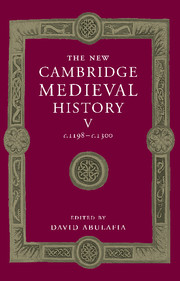Book contents
- Frontmatter
- Introduction
- Part I Common Themes
- Part II The Church in the Thirteenth Century
- Part III The Western Kingdoms
- Part IV Italy
- Part V The Mediterranean Frontiers
- Part VI The Northern and Eastern Frontiers
- 22 The Mongols and Europe
- 23 Scandinavia and the Baltic frontier
- 24 Eastern Europe
- (a) The central European kingdoms
- (b) Albania, Serbia and Bulgaria
- (c) Rus′
- 25 The Celtic lands of the British Isles
- Appendix Genealogical tables
- Primary sources and secondary works arranged by chapter
- Index
- Plate section
- Map 1 Europe in the thirteenth century
- Map 3 France, c. 1260
- Map 5 Germany and the western empire
- Map 6 Genoa, Venice and the Mediterranean
- Map 8 The Latin empire of Constantinople and its neighbours
- Map 10 Aragon and Anjouin the Mediterranean">
- References
(c) - Rus′
from 24 - Eastern Europe
Published online by Cambridge University Press: 28 March 2008
- Frontmatter
- Introduction
- Part I Common Themes
- Part II The Church in the Thirteenth Century
- Part III The Western Kingdoms
- Part IV Italy
- Part V The Mediterranean Frontiers
- Part VI The Northern and Eastern Frontiers
- 22 The Mongols and Europe
- 23 Scandinavia and the Baltic frontier
- 24 Eastern Europe
- (a) The central European kingdoms
- (b) Albania, Serbia and Bulgaria
- (c) Rus′
- 25 The Celtic lands of the British Isles
- Appendix Genealogical tables
- Primary sources and secondary works arranged by chapter
- Index
- Plate section
- Map 1 Europe in the thirteenth century
- Map 3 France, c. 1260
- Map 5 Germany and the western empire
- Map 6 Genoa, Venice and the Mediterranean
- Map 8 The Latin empire of Constantinople and its neighbours
- Map 10 Aragon and Anjouin the Mediterranean">
- References
Summary
ALL periods are transitional, but some are more transitional than others. In the autumn of 1237 the armies of Batu, grandson of Chinggis Khan, commenced their conquest of the lands of the eastern Slavs. By convention this event marks the symbolic divide between two epochs: the final extinction of the old, strained, but once-glorious ‘Kievan’ Rus′, and the beginning of the dark age of oppression under the ‘Tartar yoke’. The convention is of course too crude, though not entirely inappropriate. In the thirteenth century Rus′ existed either no longer or not yet. It was neither a polity nor a place; or rather, it was various polities and places which had less and less relationship with one another. The very idea of a thirteenth-century Rus′ (or Russia) is a modern chronological and geographical convenience, not a coherent historical entity.
This is one reading of events. According to an alternative version the impact of the Mongol invasions, while outwardly traumatic, was superficial, and should not be allowed to obscure an underlying political, social and cultural continuity: changes in thirteenth-century Rus′ were perhaps accelerated by the Mongols, but the Mongols were not the principal cause. The pendulum of interpretation swings back and forth between theories of continuity and theories of catastrophic disruption. A brief political survey of the lands of the Rus′ians in the thirteenth century can do little more than indicate some of the main points along its path.
THE RIURIKID PRINCIPALITIES, 1200–37
On first narration a political history of the pre-conquest decades seems to have the relentless and somewhat aimless drama of a soap-opera, with a cast of hundreds and a plot almost too intricate to be summarised. It is a tale of four families, four branches of a single dynasty. The dynasty is that of the Riurikids, supposedly descended from the ninth-century Scandinavian Varangian whose clan was summoned from across the seas to rule over the fractious tribes around Novgorod, and whose progeny later established their capital in Kiev.
Keywords
- Type
- Chapter
- Information
- The New Cambridge Medieval History , pp. 796 - 808Publisher: Cambridge University PressPrint publication year: 1999

